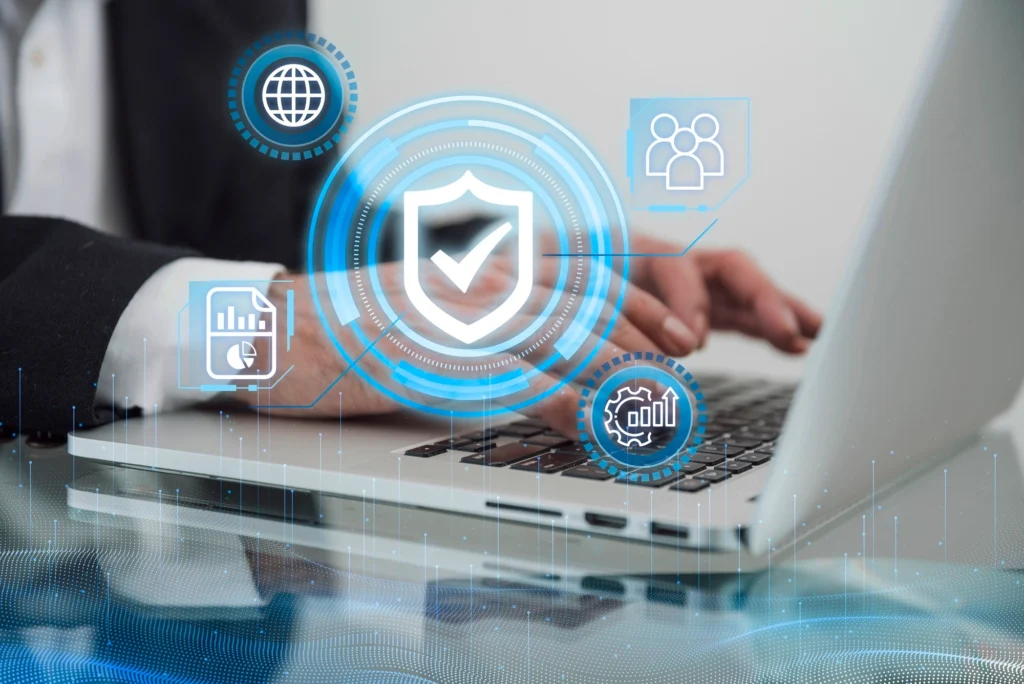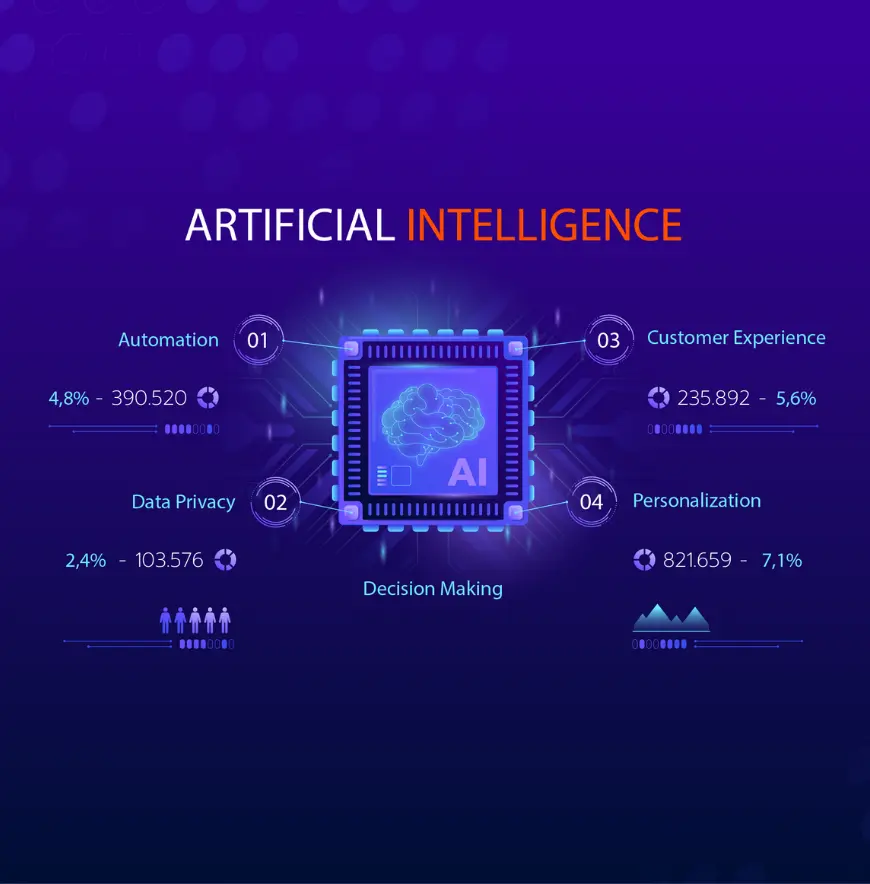Everyone is talking about the power of AI today, but there’s one thing that’s on every ones mind—what happens to the data we send to API-based LLMs? While these models can work wonders, people aren’t always clear about what happens to the data after it’s sent. Even if the data is containerized, the exact steps for retaining, training, and maintaining it aren’t transparent at all times. This lack of clarity puts a lot of sensitive information at risk. On top of that, many businesses are using multiple LLMs in tandem. This raises the question of whether data might leak between models. As more organizations embrace AI, the need for enterprise-grade security for AI solutions becomes critical. The challenge today is finding a way to tap into the potential of LLMs while keeping data safe.
Understanding Enterprise-Grade Security for AI Solutions
The adoption of AI in enterprise systems brings incredible opportunities, but it also raises the bar for security. Enterprise-grade security for AI solutions isn’t just about safeguarding data. It’s about ensuring trust in AI systems and minimizing risks. But what makes security truly enterprise-grade?

What is Enterprise-Grade Security?
Enterprise-grade security refers to a comprehensive set of robust, multi-layered security measures designed to protect business environments.
Key Features of Enterprise-Grade Security
- Data Encryption: Protects sensitive information by making it unreadable without proper decryption.
- Access Control and Identity Management: Restricts data access based on roles and permissions.
- Multi-Factor Authentication (MFA): Enhances security by requiring multiple forms of verification.
- Threat Detection and Response: Monitors systems in real-time to detect and respond to security threats.
- Compliance Management: Ensures adherence to industry regulations and data protection laws.
- Network Security: Secures networks from external threats using firewalls, VPNs, and intrusion prevention systems.
- Regular Security Audits: Identifies vulnerabilities and ensures security protocols are effective.
- Backup and Disaster Recovery: Protects data and ensures business continuity in case of a mishap.
- Security Patches and Updates: Keeps systems secure by addressing vulnerabilities with timely updates.
- End-to-End Security for Cloud and On-Premise Systems: Secures both cloud and on-premise infrastructures.
- Incident Response and Forensics: Provides protocols for handling breaches and investigating attacks.
Why Is Security Critical for AI Solutions?
Data is one of the most valuable assets for any organization. Especially in the age of AI, where its power drives innovation. With great value comes great responsibility. Sensitive data—such as customer information, intellectual property, and financial records—can be a prime target for cybercriminals. According to a report by IBM, the average cost of a data breach in 2023 was a staggering $4.45 million.
Key Risks in AI Solutions Without Enterprise-Grade Security
Data Breaches and Privacy Concerns
In 2024, data breaches related to AI tools and the security risks surrounding their integration are growing concerns. For instance, AI companies, including OpenAI, have been vulnerable to hacks. Such as the breach in 2023 where a hacker accessed internal discussions and sensitive information related to AI research. While no customer data was reportedly stolen, the breach highlighted the increasing importance of data security in AI.
AI-driven security threats are evolving, with adversaries using AI to launch attacks faster and more effectively. These include AI-powered phishing campaigns, deepfakes, and ransomware attacks. As AI becomes more deeply embedded in enterprise operations, security risks expand.
Organizations adopting AI should also be cautious of shadow AI—unapproved AI tools that could unintentionally expose sensitive data. This is particularly concerning in cases where proprietary or confidential business data is shared with generative AI tools.
The 2024 security trend also highlights the importance of implementing AI security measures for businesses to mitigate these risks. Businesses must ensure that they are using AI tools that comply with data privacy standards.

Intellectual Property Theft
Unsecured AI models present significant risks to intellectual property and proprietary algorithms. They can expose valuable business information. Sensitive data used to train these models can often be accessed through unintended user interactions. For example, proprietary algorithms may be compromised when AI tools are not properly isolated or when confidential data is entered into third-party AI platforms that lack robust data protection. In 2024, this risk is compounded by the growing use of generative AI. Generative AI can replicate, regenerate, or even extract unique business insights from proprietary datasets.
Compliance and Regulatory Risks
Non-compliance with data protection laws like the GDPR, CCPA, and other regional regulations poses a serious risk for companies using AI. These laws require organizations to safeguard personal data, ensuring it is used lawfully. Violations can occur if sensitive data is processed without proper consent or if AI models expose personal information. Inadequate data protection not only risks hefty fines but also damages trust, which is essential for customer loyalty. As AI continues to evolve, adhering to these compliance frameworks becomes crucial for mitigating risks.
Core Components of Enterprise-Grade Security for AI
Robust Data Encryption
Data encryption ensures that sensitive information is protected both when stored (“at rest”) and during transmission (“in transit”). For example, encrypting communications between AI models and cloud servers prevents unauthorized access. Companies like Google and Microsoft utilize strong encryption to secure user data across their AI platforms.
Identity and Access Management (IAM)
IAM controls who can access AI systems and their data, ensuring that only authorized users have the necessary permissions. For instance, using multi-factor authentication (MFA) in IAM protocols helps prevent unauthorized access. Amazon Web Services applies IAM for securing user access to AI tools and services.
Threat Detection and Response
AI systems can leverage advanced algorithms to detect abnormal behaviour and mitigate cyber threats in real time. For example, AI-powered intrusion detection systems used by companies like IBM continuously monitor for potential threats and automatically initiate responses. These include blocking malicious IP addresses to reduce the risk of breaches.
Benefits of Enterprise-Grade Security in AI Solutions
Enhancing Customer Trust
By implementing enterprise AI data protection, companies can build customer confidence in their systems. This trust is crucial in industries like banking and healthcare, where sensitive information is involved.
Safeguarding Business Reputation
Security incidents can severely damage a company’s reputation, leading to public relations nightmares and customer attrition. Secure AI solutions for enterprises help prevent such breaches. this ensures the business maintains its credibility and consumer trust over time.

Future-Proofing Against Evolving Threats
As cyber threats continuously evolve, enterprise-grade security for AI solutions ensures that organizations stay ahead of these challenges. This resilience helps businesses safeguard their operations from emerging risks and potential vulnerabilities.
DaveAI’s Commitment to Enterprise-Grade Security
Here’s how DaveAI upholds its security standards across multiple areas:
- Data Security: DaveAI’s solutions ensure that all data is encrypted to the highest standards.
- Compliance with Global Regulations: DaveAI ensures compliance with major data protection laws such as GDPR, CCPA, and other international regulations.
- Customizable Security Framework: The Secure Governance Layer of GRYD offers enterprises full control over data access and usage.
- Bespoke Small Language Models (SLMs): DaveAI’s use of SLMs ensures a low-latency, lightweight AI experience while maintaining high security. These models are tailored to the specific needs of the enterprise. This minimizes risks associated with larger, generalized models.
- Internal Data Protection: Through tight internal controls and rigorous access management DaveAI ensures that the integrity of enterprise data is preserved.
- Cross-functional Information Security: As enterprises expand, involving collaborators becomes a necessity. DaveAI addresses this by defining clear boundaries for cross-functional access. This ensures that only those with the right permissions can engage with sensitive data.
- Managing Data Leaks Between LLMs: With multiple LLMs often used together, there is an inherent risk of data leakage. DaveAI mitigates this by ensuring that data flow between models is controlled.
DaveAI offers a scalable AI security architecture that helps enterprises maximize the potential of AI. Our commitment to secure AI solutions for enterprises is a cornerstone of our strategy to provide globally relied upon experiences.
Implementing Enterprise-Grade Security in AI Solutions: Best Practices
Look for vendors who provide transparency in how they handle data. AI solutions are not one-size-fits-all. Make sure the vendor can customize their solution to meet your unique business needs. The ability to have control over training data, model behaviour, and outputs ensures you’re getting a tailored AI experience without compromising security.
Ensure that the vendor follows ethical AI practices. This includes ensuring fairness, transparency, and accountability in their AI models. For example, ask how they audit AI decisions to ensure they align with ethical standards. With increasing concerns about AI, a vendor committed to these values can protect your company’s reputation.
Ensure that the AI vendor is committed to providing regular updates and patches to their software. Cyber threats are constantly evolving, and staying ahead of them requires continuous maintenance. A proactive vendor will regularly update their systems to fix any vulnerabilities and improve performance.
If the vendor’s solution integrates with third-party tools, it’s important to ensure those integrations do not introduce security risks. Ask about the security measures they have in place for third-party connections, such as using secure APIs, data encryption, and access controls.
Before committing, research the vendor’s track record. How many similar companies have they worked with? What is their history with maintaining security? Reviews and case studies can provide a better sense of their ability to meet your expectations, ensuring safe deployment of AI models.
FAQs About Enterprise-Grade Security for AI Solutions
The biggest risks of unsecured AI solutions include data breaches, intellectual property theft, privacy violations, compliance failures, and exposure to cyberattacks.
Enterprise-grade security for AI solutions can be costly, but its long-term value in protecting sensitive data often outweighs the initial investment.
Businesses can improve AI security by implementing strong encryption, establishing robust access controls, conducting regular security audits, and adopting AI-specific threat detection systems to identify vulnerabilities proactively.



